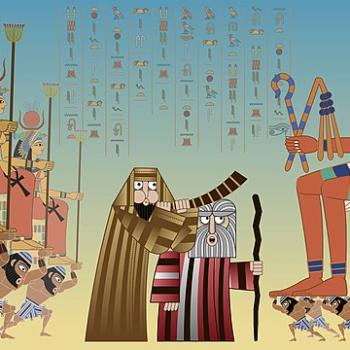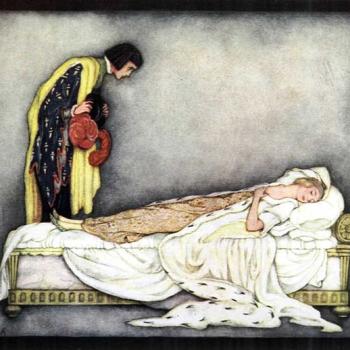I’m certainly not the first one to point out that Christianity is a faith that entails a thousand paradoxes (G. K. Chesterton, of course, was the master at delineating them). But it may be possible that I can shed a little light on one in particular, and I feel that this paradox is especially odd.
As Christians, we are called upon to be soldiers, of a sort – marching ever onwards, as the hymn has it, waging spiritual warfare and sacrificing our very lives, if necessary, in the great bloody contest the world insists on throwing at us. “The Christian life” a popular recent meme maintains, “is not to be lived on a luxury cruise ship, but on a battleship.” God the Father is a Lord of Hosts (Armies), and we are His shock troops in a realm that is infested with His enemies. Even angels carry swords and clubs, and they are massed in squadrons and serried ranks. When the Israelites marched out of Egypt after their long enslavement, the Hebrew text uses terms that suggest they did so in battle formation.
Yet on the other hand, how many times are we exhorted, in the New Testament, to be meek (as Christ described himself), humble, esteeming others more worthy than ourselves, speaking only that which builds up the people around us? The epistles are full of instructions for us to lead quiet, peaceful lives, standing out from those around us only by the charity and grace and sweet deportment with which we impress our more rambunctious neighbors. Believers are to be calm, quietly joyful (though they may sing an occasional dithyramb of praise), trusting, tranquil, and the souls of equanimity.
What kind of soldier is that? Where is the fierceness or bravado of the professional men of arms? Where is the controlled bloodlust and hardy vigor that distinguish the military hero? Even the club-wielding angels of Ezekiel’s vision, who slaughtered thousands of erring Hebrews, displayed a grim and rigorous determination – one can almost see their set jawlines and the sinewy grip on their weapons. Are we dealing simply with a stark black-and-white distinction between the Old and the New Testaments, and the two different Gods in the pages of each?
Then we remember that it was the meek and mild soldiers of Christ who defeated the Roman Empire, not the javelin-throwing kind. The God of both Testaments knows, apparently, what He is doing when He pits one kind of soldier (the sling-bearing one) against a certain enemy, at a certain point in time, and when He throws a phalanx of pacificists against a different army at a later period. One assumes that a more traditional military was needed to carve out a toehold in the Near East for God’s invasion of the world, and that a radically new type of unoffending corps was needed to spread that toehold worldwide.
So throughout our planet various peoples witnessed the fresh phenomenon of lamblike peasants and humble artisans overcoming legions of human infantry and subhuman demons, with nothing more than love and silent defiance. What this reveals to us, I believe, is that the spiritual sphere is so utterly alien to the physical (though some analogies exist), that what is up in one is down in the other, and black and white are reversed.
When Paul says in 1 Corinthians 2:9 that “Eye has not seen, nor ear heard, nor have entered into the heart of man the things which God has prepared for those who love Him”, I have two reactions: one fearful, the other infinitely reassured. I am fearful because this verse affirms my suspicion that things in Heaven are so radically and unimaginably different from anything I know here, that I’m sure I will be overwhelmed, completely intimidated, floored, and awed into imbecility. On the other hand, the verse promises me that when I am thus overwhelmed, it will be because I had no idea how devastatingly good Goodness can be.













